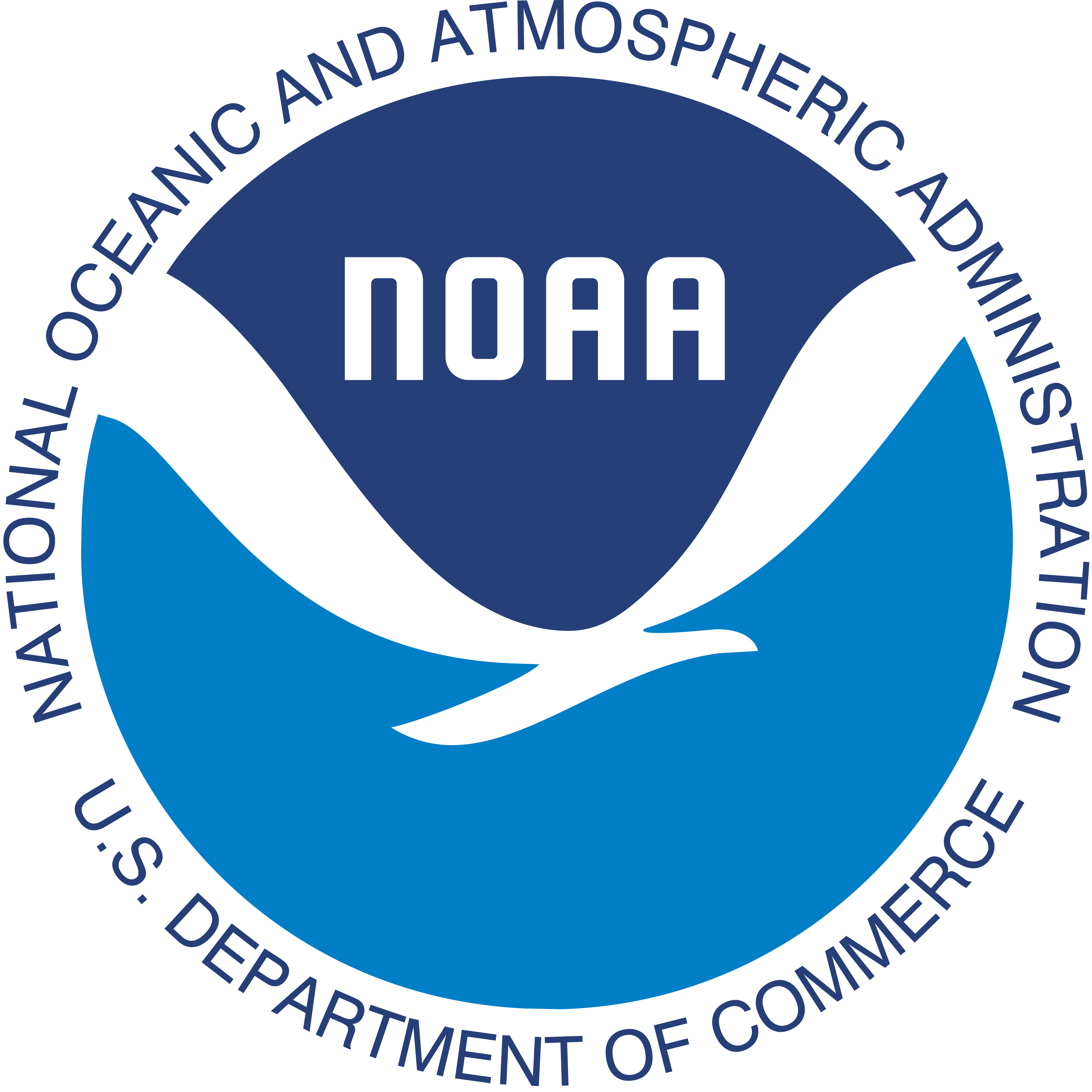KINGSTON, R.I. – April 12, 2022 – Eight University of Rhode Island sophomores have been awarded the Ernest F. Hollings Scholarship from the National Oceanic and Atmospheric Administration, the most prestigious scholarship awarded to undergraduates in marine sciences. The University is the top producer of Hollings Scholars among the 84 institutions represented in this year’s selection pool.
The group also represents the largest number of URI students to win the annual award in a single year. This marks the 14th straight year that at least one URI student has been named a Hollings Scholar. Since the start of the program in 2005, URI students have won 41 Hollings Scholarships, which have provided more than $675,000 in scholarship funds in addition to earnings from a paid NOAA summer internship between the junior and senior years.
“We are all so proud of our students’ achievements and look forward to watching their careers develop over the next two years,” said Jacqueline F. Webb, the George and Barbara Young Chair in Biology and coordinator of the marine biology program.
“This remarkable achievement indicates not only the strong students in our marine sciences majors, but also the value and importance of the early mentorship and access to research opportunities that students find at URI,” said Kathleen Maher, who oversees the Office for National Fellowships & Academic Opportunities.
This year’s recipients are Matthew Brander, a double major in marine biology and aquaculture and fisheries science from Stratford, Connecticut; Taya Clements, a marine biology major from Exeter, Rhode Island; Molly Halla, a geology major from Wakefield, Rhode Island; Kara James, a marine biology major from St. Paul’s, Antigua and Barbuda; Ellie Madigan, a double major in marine biology and wildlife conservation biology from Warner, New Hampshire; Zoe Scipioni, a double major in marine biology and wildlife conservation biology from Bedford, Massachusetts; Maricarmen Serna, a double major in marine biology and environmental and natural resource economics from San Antonio, Texas; and Alexandra Sinno, a marine biology major from Morristown, New Jersey.
Annually, about 120 students from around the country are awarded a Hollings Scholarship, which includes $19,000 in scholarship funds for the students’ final two years of undergraduate study and a paid internship at a NOAA facility the summer between their junior and senior years. It also provides funding to participate in two Hollings conferences at NOAA headquarters, or virtually, and to attend up to two scientific conferences to present the results of their NOAA internship.
URI’s 2022 Hollings Scholars:
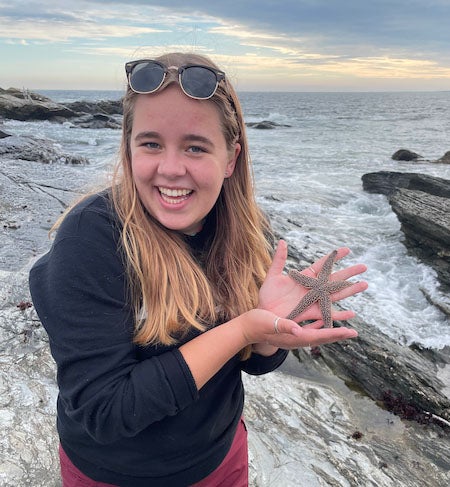
Back when she was looking at colleges, Ellie Madigan chose URI because of the opportunities for research experience, which she’s pursued since her freshman year. Madigan has worked in Professor Coleen Suckling’s lab on urchin aquaculture. As a College of the Environment and Life Sciences (CELS) Coastal and Environmental Fellow, she has studied brook trout with Professor Graham Forrester. And she has volunteered with the Save the Bay Exploration Center educating the public on the plethora of organisms living in Narragansett Bay. This summer, she will travel with Forrester to study coral reef fish ecology in the British Virgin Islands.
Her interest in marine biology started in high school, joining a passion for climate change and a plan to eventually conduct research on the effects of climate change on the marine environment. “I do not have a specific species or ecosystem of interest,” she said. “It’s too hard to pick because the ocean is so vast. I know that I want to work in conservation and public outreach/education. But whatever I end up doing, I know I want to be able to do fieldwork.”
For her NOAA internship, tops on her wish list are working on NOAA’s marine sanctuary projects or other conservation efforts, said Madigan, who would like to eventually work in conservation research for a government agency such as NOAA or a nonprofit organization.
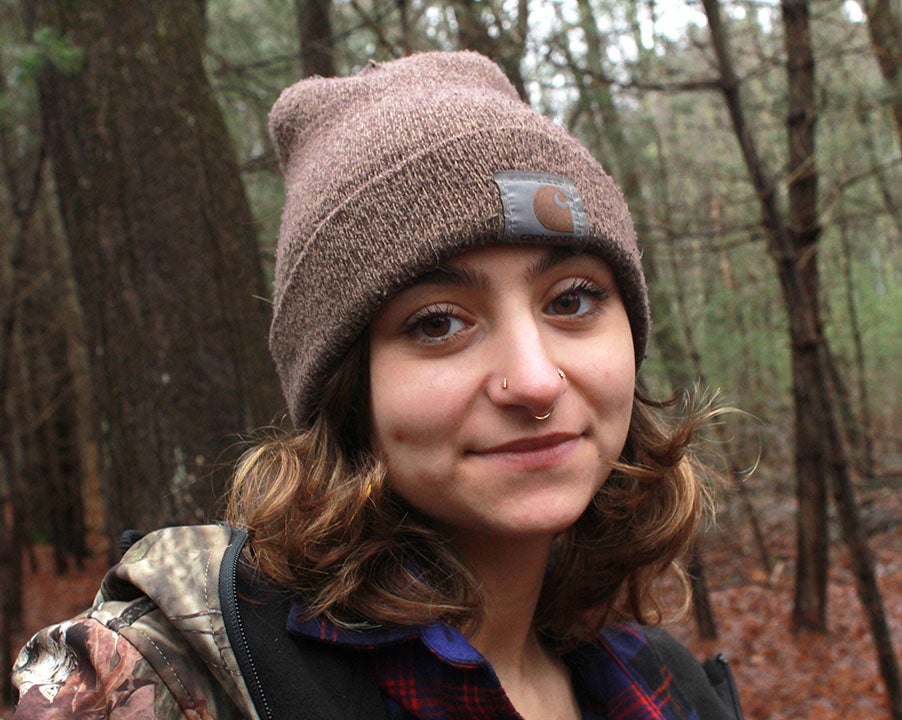
Alexandra Sinno became interested in marine biology during her junior year of high school, trading in her dreams of a career in musical theater after seeing the documentary “Chasing Coral.” Since then, her interest has grown in studying coral reefs and other cnidarians and how they react to climate change, ocean acidification and other human-influenced threats.
This summer, she will take part in a paid Research Experiences for Undergraduates internship funded by the National Science Foundation at Florida Atlantic University, where she will study marine ecosystem health with Colombian marine biologist Andia Chaves Fonnegra. In the fall, Sinno will head to Bermuda for a URI study abroad program that includes classes in coral reef ecology, marine invertebrates, research diving and independent research.
“For the Hollings Scholarship, I really hope I get to do an internship that involves coral reef restoration and health. That would be amazing,” said Sinno, who plans to pursue a master’s degree in marine biology with a focus in coral reef biology after URI.
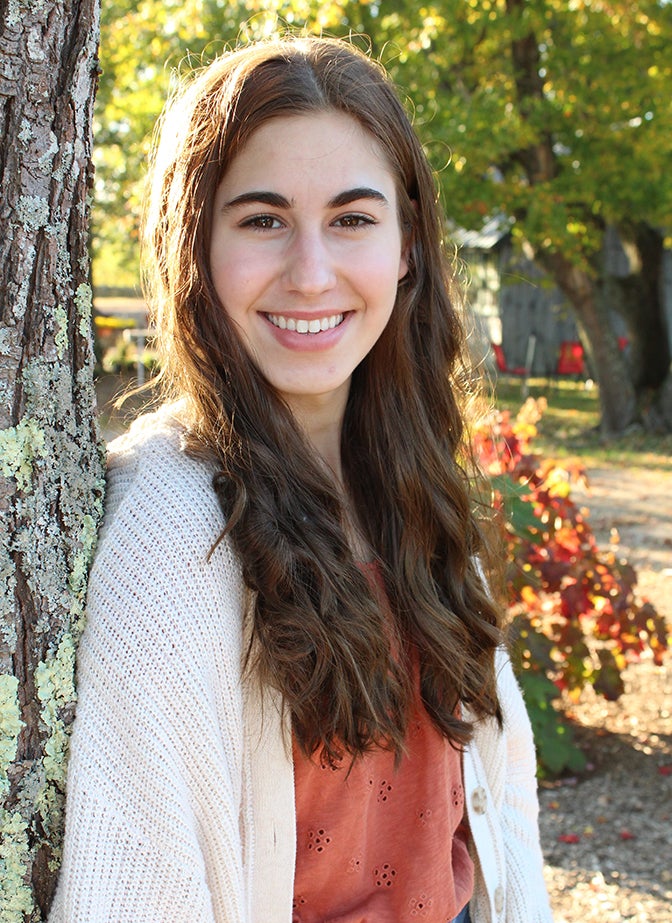
Growing up in the Ocean State, Taya Clements spent a lot of her free time at the ocean, but a fishing trip off Block Island with her father sealed her interest in marine biology. On the trip, she saw a pod of dolphins for the first time.
Clements’ research interests include coral reef ecosystems, tropical fish and aquatic plants, and she is working in Professor Carlos Prada’s lab studying coral skeletons. “I am learning about different coral species. It has fueled my passion for coral reefs and led me to realize that I want to conduct field research on them,” said Clements, who will be a Coastal and Environmental Fellow this summer studying the effects of climate change on brook trout in Rhode Island streams.
For her NOAA internship, she would like to participate in fieldwork studying the impacts of climate change and incorporating strategies for ecosystem-based management. She hopes that this experience will give her insight into the type of research she wants to pursue in the future.
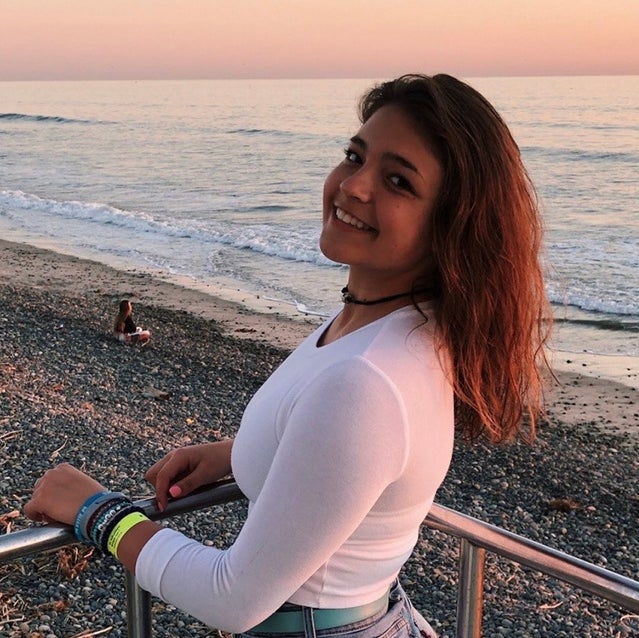
Maricarmen Serna has seen her focus in the field of marine biology up close. Her family spent a lot of time in Cancun, Mexico, when she was growing up and she literally dove head-first into marine activities, swimming with whale sharks, reef sharks, dolphins, and rays, along with scuba and free diving, and fishing.
At URI, she has pursued interests in sustainability and species conservation in her classes, caught and tagged blue and mako sharks with Professor Bradley Wetherbee and worked in his lab. She will continue that work this summer as a CELS Science and Engineering Fellow.
About the NOAA internship, she said, “I hope to take this hands-on opportunity and learn field methods, execute successful analysis and present the findings of complex research topics effectively. I can’t wait to expand my research proficiency and enjoy a once in a lifetime opportunity working alongside a NOAA researcher.”
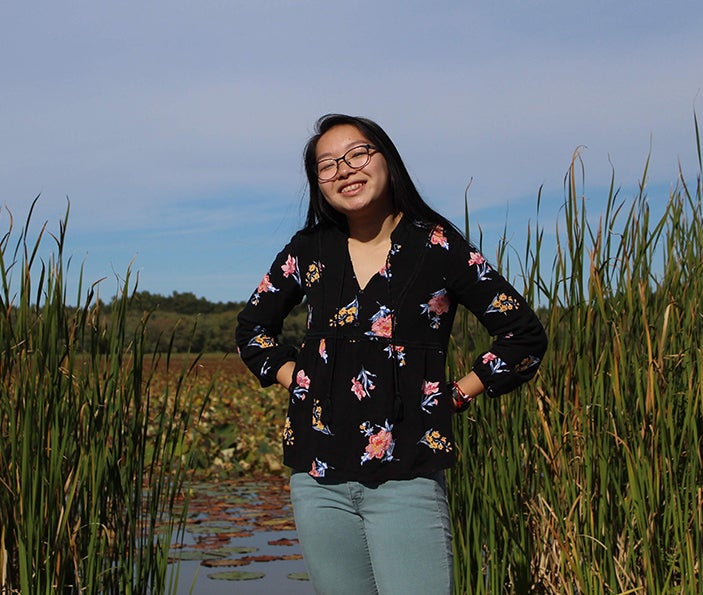
Zoe Scipioni has always had a love for the environment, but her interest in marine life took hold during a high school trip to the Galapagos Islands. Her interests have led to a focus on conservation of endangered species and a desire to work on coral reef ecosystems.
“During my NOAA internship, I hope to get more experience working with professionals in the field and becoming more familiar with how research is conducted,” she said. “I would love to work on a project that deals with conserving coral reef ecosystems, but I will be happy with whatever I end up doing.”
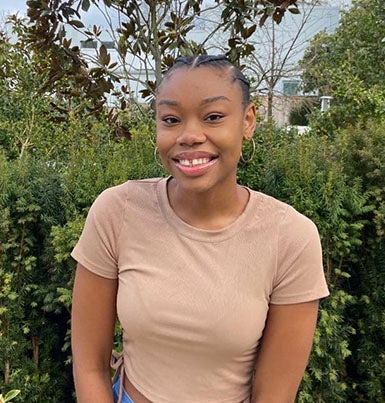
Kara James’ chief interests also center on coral reef protection, along with preserving mangrove habitats and studying stingrays and reef fishes. From her earliest days growing up in the Caribbean, she’s been attracted to the sea and enjoys snorkeling, swimming and sailing.
“I fell in love with all the different animals and coral reefs,” she said. “When I realized how bad climate change affected the corals, I decided that in order to help I could study marine biology and help other people reduce their impact on the ocean by educating them.”
James, whose research experience includes working in Professor Prada’s lab analyzing DNA in water samples from Narragansett Bay, hopes her NOAA internship will include work on coral reef protection, along with fishes that depend on the reefs to survive.
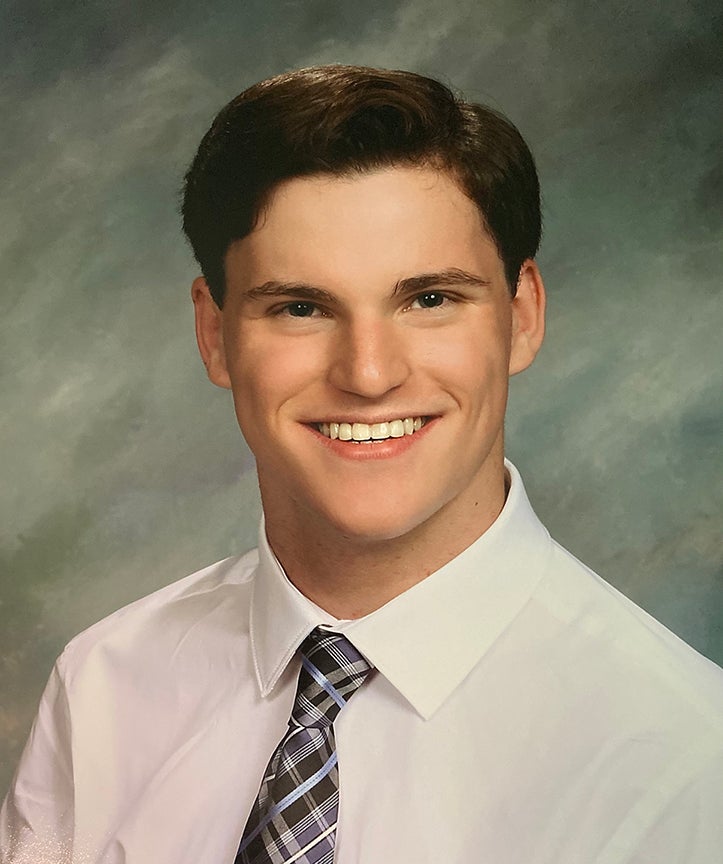
Growing up, Matthew Brander’s family went on fishing trips and had home aquaria, which fostered his interest in marine biology and led him to study at a marine science-focused high school. At URI, he’s taken courses in marine biology and ecology, joined clubs and student organizations on related topics, and has started to work in Professor Jacqueline Webb’s lab.
For his Hollings Scholarship, Brander, who would like to pursue a master’s degree and Ph.D. after URI, hopes to conduct field research on large, ecologically important fishes, such as sharks and tuna.
Molly Halla became fascinated with geology thanks to a class on Earth Systems, taught by a “great teacher,” her freshman year of high school, and has pursued interests in climate change and sea ice cover. At URI, she joined the Geology Club, has gone on field trips with her Problems in Earth History class, and has started doing undergraduate research.
Through Professor Dawn Cardace’s Earth History class, Halla attended a geology conference in Maine, where she was able to collect samples at Puzzle Mountain, and took sediment cores at a Jamestown, Rhode Island, salt marsh to investigate the history of the marsh.
For her NOAA internship, she hopes to study sea ice cover, noting the three NOAA labs that study the topic. “I am fascinated by how scientists measure and predict sea ice cover using remote sensing and climate models and could see myself in this area,” Halla said.
The Hollings Scholarship program is designed to increase undergraduate training in oceanic and atmospheric science, foster public support of stewardship of the ocean and atmosphere, and recruit and prepare students for public service at NOAA and other natural resource agencies.
URI students interested in applying for the Hollings Scholarship are encouraged to contact Kathleen Maher in URI’s Office of National Fellowships and Academic Opportunities. While institutional endorsement through the office is not required for the Hollings, the Office has offered guidance and support for candidates since it opened in 2009. Since that time, 38 URI students have won Hollings Scholarships.
This news release has been updated to include a seventh student who was named a Hollings Scholar.

